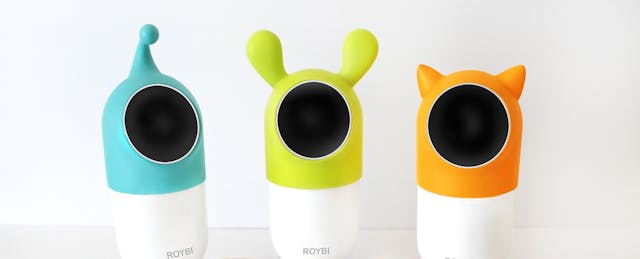The two-legged, pill-shaped robot—upper half green, lower half white and small enough to stand on one’s palm—starts its lesson with a greeting. “Hello my friend. Welcome back,” it says. “Today is a great day to learn about animals.”
Designed for children ages 3 to 7, the robot, Roybi, aims to teach kids at home a range of early-childhood developmental skills. In a rare demo of its abilities, Robyi’s founder and CEO, Elnaz Sarraf, listens to the robot name colors, animals and their accompanying noises while displaying pictures on its torso. The black cat meows. The orange lion roars. The robot then asks the user to repeat the information back to the robot, as practice.
Sarraf hopes the robot and her company of the same name can reach homes and families, just as they have reached the wallets of two angel investors who have injected $4.2 million seed funding to help Roybi go to market. The company did not disclose their names.
Currently, Roybi has about 500 lessons, stories and songs, promising to introduce children in school or at home to over 70,000 words in English, Spanish and Chinese. Subjects include colors, animals and shapes. The robot is not yet available; when it is, the company says it will retail for $299.
The robot has technology to detect children’s faces and recognize individual users to turn on and start its lessons. It records video and audio as children practice the lesson or if parents manually tell it to record or snap pictures through the Roybi app. The app also provides progress data on children’s learning.
Such features in other internet-connected devices that can record children have proven controversial in the past. Amazon has been named in a lawsuit over allegations that Alexa devices record kids without consent. Germany banned an interactive doll called My Friend Cayla that collected data, and consumer advocates protested sales of the doll by retailers like Amazon and Walmart.
To these concerns, Sarraf says parents can turn the recording features off at any time. The company is also working with Amazon on data collection and storage compliance.

Makers of devices that come equipped with video and audio recording capabilities, whether that data is stored on the device or online, should be transparent with consumers right on the device’s packaging as well as on the company’s website, says Stacey Gray, senior policy counsel at the Future of Privacy Forum, an advocacy group based in Washington, D.C.
Even when not in a classroom, certain toys must adhere to the federal Children’s Online Privacy Protection Act, commonly called COPPA. “Anything involving video and audio and children is uniquely sensitive,” she adds.
Founded in 2017, Roybi now has six full-time employees. The company has also participated in several education technology accelerator programs, including xEdu in Finland and Edstart by Amazon Web Services. “Our focus is the U.S. and Canada this year,” says Sarraf, 34. “Early next year, we’ll be focusing a lot on China, where there is a huge demand for language learning.”
Roybi plans to raise additional funds through a crowdfunding campaign on Indiegogo before mid-August. The company is also in talks with retailers, an area of expertise for Sarraf, who co-founded iBaby Labs in 2013. iBaby provides internet-connected baby monitors which are sold by retailers including Apple, Best Buy, Walmart, Sears and Target.
The idea of robots teaching children has been the stuff of both dreams and dystopian fantasies, depending on whom one asks. But some studies have suggested that bots could help with learning new languages. A 2016 study of 67 students from researchers with Disney, University of Plymouth, University of Lincoln and Ghent University found that the children who used robots saw scores “improve significantly between a pre- and a post-test” on French language skills.
Another study, by Massachusetts Institute of Technology researchers, used a group of 17 children to gauge the potential for robots supporting early language development. “All children learned new words, created stories, and enjoyed playing,” according to the study. “Children who played with a matched robot used more words, and more diverse words, in their stories than unmatched children.”
During Roybi the robot’s rare demonstration, its starts a lesson on numbers with an air of mystery. “Let me tell you a secret,” says the robot. “I can count to three.” The robot, still in a pilot stage, gets stuck on the number one. But after a reset, Roybi makes it to three, completing the lesson for the day. “Come back tomorrow,” it says.


